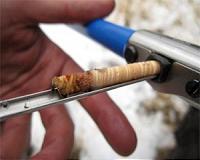| . |  |
. |
Tempe AZ (SPX) Dec 17, 2010 Enormous uncertainty. These two words describe the condition of Phoenix's climate and water supply in the 21st century. Reservoirs have dipped to their lowest levels, continuous drought has plagued the state and forecasts for even warmer summers are predicted. Despite this uncertainty, professors at Arizona State University say there's no need to be fearful because positive impacts can be made. ASU professors Patricia Gober and Craig Kirkwood working in conjunction with Decision Center for a Desert City (DCDC), which specializes in decision making under uncertainty, assessed the climate's affect on water shortage in Phoenix. Their results were published in the Online Early Edition of the Proceedings of the National Academy of Sciences. A special section in this PNAS issue focuses on what the 21st century climate in the Southwest will mean in terms of sustainability. Their paper, "Vulnerability assessment of climate-induced water shortage in Phoenix," discusses simulation modeling and the principles of decision making under uncertainty, looks at human vulnerability to environmental risks in terms of water shortages, looks at factors that affect water supply and provides numerous options for solutions. Factors such as population growth, increased development, outdoor landscaping and more private pools all affect water supply. Gober and Kirkwood used an integrated simulation model, called WaterSim, to investigate the long-term consequences of policies that manage groundwater, growth and urban development in Phoenix. Gober, who also is director of DCDC, said the goal is not to preach an agenda but to provide the science that supports better decision making. "If you make this set of choices then you can continue to have a vibrant city even under dire climate conditions. We have a smorgasbord of choices," Gober said. "You pick the menu items that are going to work best for your community." Adapting to a shortage in water supply, Gober said is "not a one size fits all answer." The paper points out a few things people can do such as changing their type of landscape, limiting the number of pools in a community, building a higher density city and investing money to fix water leaks. Gober, who also studies the relationship between energy and water in relation to the urban heat island, said, "just because we don't know what's going to happen with the climate, doesn't mean we can't or shouldn't do anything." Researchers at DCDC, which is funded by the National Science Foundation, discuss risk management and strategies in terms of water supply. "Uncertainty can paralyze decision making," Gober said. "But DCDC and this paper say, look we don't know what the future holds, but we can still do things to reduce risk and protect ourselves from water shortages."
Share This Article With Planet Earth
Related Links Arizona State University Decision Center for a Desert City (DCDC) Water News - Science, Technology and Politics
 Hot With Decades Of Drought: Expectations For The Southwest
Hot With Decades Of Drought: Expectations For The SouthwestTempe AZ (SPX) Dec 15, 2010 An unprecedented combination of heat plus decades of drought could be in store for the Southwest sometime this century, suggests new research from a University of Arizona-led team. To come to this conclusion, the team reviewed previous studies that document the region's past temperatures and droughts. "Major 20th century droughts pale in comparison to droughts documented in paleoclim ... read more |
|
| The content herein, unless otherwise known to be public domain, are Copyright 1995-2010 - SpaceDaily. AFP and UPI Wire Stories are copyright Agence France-Presse and United Press International. ESA Portal Reports are copyright European Space Agency. All NASA sourced material is public domain. Additional copyrights may apply in whole or part to other bona fide parties. Advertising does not imply endorsement,agreement or approval of any opinions, statements or information provided by SpaceDaily on any Web page published or hosted by SpaceDaily. Privacy Statement |